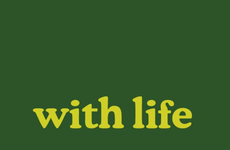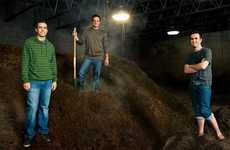
Socially Innovative Rugby Balls
Bianca — January 17, 2012 — Social Good
References: trendhunter
When we first profile the TOUCH Initiative, it was an instant hit with our community, so we're excited to share our interview with the founder, Thurlow Hanson-Moore, below.
As a quick recap, the triple bottom line business employs seamstresses in South Africa who create rugby balls from recycled materials like old billboards, then stuff the balls with plastic bags. They are currently expanding their product line into soccer, netball and cricket.
4 Questions with Thurlow Hanson-Moore, Founder of the TOUCH Initiative
1. How did the idea for the business model come about?
We incubated The Touch Initiative as part of a cause-related marketing campaign for Enviroserv (South Africa's largest waste management business). We pitched the idea of developing a social business in green innovation/job creation as a corporate social responsibility project and then using the annual marketing budget to launch it. The winwin creative team came up with the idea of a ball that recycles, cleans up and creates work opportunities for out-of-work seamstresses (our local textile industry is a mess thanks to cheap imports -- not a problem unique to our shores). With South Africa's rugby obsession and the 2011 World Cup on the calendar, it didn't take a rocket scientist to work out that this idea would generate media interest.
2. How did you decide to join this sector?
We have a social strand to our business (having started out as satirical theatre makers, recycled into behaviour change communication producers, and then into cause-related marketing). We donated one of our businesses to Cida University a while back as an experiment in alternative CSI (a story in itself) and were involved in developing a small entrepreneurship focused campus from scratch (Eden Campus - also a story in itself). Our new business director has spent the last year with Foundacion Paraguaya - a real power-house in education that pays for itself. We employ people from creative, consulting and NGO/NPO backgrounds with a mandate to drive social into the mainstream.
3. How do you get your inspiration?
We have a weekly connect where everyone gets to present ideas and where we invite interesting people to share projects or ideas. Other than that, the usual: websites like yours and Springwise, books, conversations, cereal boxes. More pragmatically we have a 5% rule in our wider business -- beyond the socially-focused divisions -- every project manager is incentivized to spend 5% of the budget socially. This gets all our people thinking socially and grows our network.
4. How do you reset yourself to be creative? Do you have any rituals?
No rituals. We try to make a piece of mainstream theatre every year to keep us in touch with our roots. But with the credit crunch we've skipped the last two years.
As a quick recap, the triple bottom line business employs seamstresses in South Africa who create rugby balls from recycled materials like old billboards, then stuff the balls with plastic bags. They are currently expanding their product line into soccer, netball and cricket.
4 Questions with Thurlow Hanson-Moore, Founder of the TOUCH Initiative
1. How did the idea for the business model come about?
We incubated The Touch Initiative as part of a cause-related marketing campaign for Enviroserv (South Africa's largest waste management business). We pitched the idea of developing a social business in green innovation/job creation as a corporate social responsibility project and then using the annual marketing budget to launch it. The winwin creative team came up with the idea of a ball that recycles, cleans up and creates work opportunities for out-of-work seamstresses (our local textile industry is a mess thanks to cheap imports -- not a problem unique to our shores). With South Africa's rugby obsession and the 2011 World Cup on the calendar, it didn't take a rocket scientist to work out that this idea would generate media interest.
2. How did you decide to join this sector?
We have a social strand to our business (having started out as satirical theatre makers, recycled into behaviour change communication producers, and then into cause-related marketing). We donated one of our businesses to Cida University a while back as an experiment in alternative CSI (a story in itself) and were involved in developing a small entrepreneurship focused campus from scratch (Eden Campus - also a story in itself). Our new business director has spent the last year with Foundacion Paraguaya - a real power-house in education that pays for itself. We employ people from creative, consulting and NGO/NPO backgrounds with a mandate to drive social into the mainstream.
3. How do you get your inspiration?
We have a weekly connect where everyone gets to present ideas and where we invite interesting people to share projects or ideas. Other than that, the usual: websites like yours and Springwise, books, conversations, cereal boxes. More pragmatically we have a 5% rule in our wider business -- beyond the socially-focused divisions -- every project manager is incentivized to spend 5% of the budget socially. This gets all our people thinking socially and grows our network.
4. How do you reset yourself to be creative? Do you have any rituals?
No rituals. We try to make a piece of mainstream theatre every year to keep us in touch with our roots. But with the credit crunch we've skipped the last two years.
Trend Themes
1. Socially Innovative Products - Opportunity to develop products that create social, environmental, and economic impact.
2. Recycled Materials - Opportunity to leverage discarded materials to create new products, reducing waste and promoting sustainability.
3. Alternative Corporate Social Responsibility - Opportunity to explore innovative approaches to corporate social responsibility that go beyond traditional philanthropy.
Industry Implications
1. Sporting Goods Manufacturing - Opportunity for sports equipment manufacturers to incorporate sustainable materials and social impact into their products.
2. Waste Management - Opportunity for waste management companies to partner with social enterprises and create value from discarded materials.
3. Creative Consulting - Opportunity for creative consulting firms to help businesses develop alternative approaches to corporate social responsibility and sustainable product innovation.
0.8
Score
Popularity
Activity
Freshness























